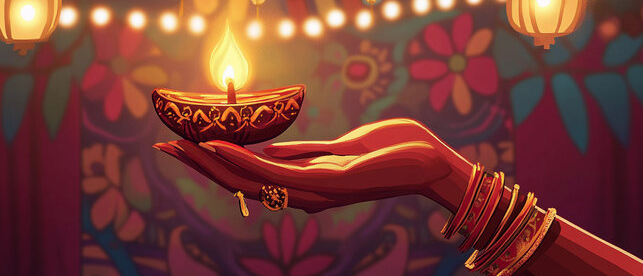Diwali for Dummies
By: Aryan Bachu and Gia Shah
Diwali is one of the most widely celebrated holidays in South Asian culture. The word ‘Diwali’ means ‘The Festival of Lights. It comes from the ancient Sanskrit word dīpāvali, which means ‘row of lights’. It celebrates the triumph of good over evil and light over dark. The holiday spreads the aroma of joy throughout homes and evokes a sense of community through the many ways Diwali is celebrated for the duration of the festival.
The first day of the festival called Dhanteras celebrates the lord Dhanavantri, the god of Ayurveda, and promotes wellbeing and healthy lives.
On the second day, Naraka Chaturdashi, people celebrate Krishna’s victory over the reign of the demon Narakusa and promote the triumph of good over evil.
The third and main day of Diwali, Lakshmi Puja, is dedicated to honoring the Goddess Lakshmi to bring wealth and prosperity to homes.
The next day, Annakut, or the celebration of Krishna and Govardhan Hill, is celebrated by cooking and serving Krishna a wide range of vegetarian dishes to symbolize the lord’s supreme power.
On the fifth and final day of Diwali, Bhai Dooj honors the unbreakable bond between brothers and sisters and highlights protection against the evil and blessings of prosperity.
Throughout the festival, people will celebrate by doing different things, like lighting diyas, which are clay holders for tealight candles, all throughout their homes to capture the ambiance of the light. People also will set off fireworks to celebrate the triumph of Lakshmi and Krishna. People will also exchange delicious sweets called mithai with one another as homage to the deities and to spread joy across their community. Another way people celebrate is by making art outside their houses with a colored powder called rangoli, to draw prosperity and wealth to their homes.
As our world is modernizing and changing, so are the ways Diwali is being celebrated. Many engage in contemporary takes on old traditions by creating an extravaganza from the core holiday. On a more literal spectrum, people also have more access to fireworks and sparklers, so even people in low-income families can still celebrate Diwali with sparklers, poppers, and more. As Diwali adapts to modern times, its essence remains a vibrant display of faith, hope, and togetherness.

